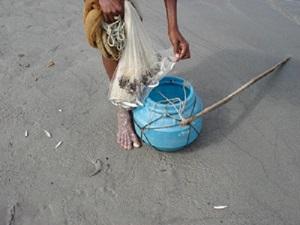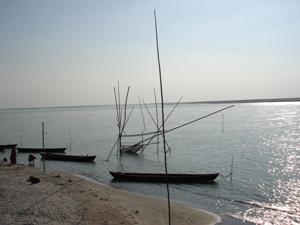Sunita Chaudhary
Other projects
The project aims to motivate people for conservation of dolphins and its habitat, the Koshi river ecosystem. It aims to help diversify the livelihood of people, especially the fishers and indigenous communities who are completely dependant upon the Koshi River.

Fishing a base of livelihood of the local people.
Nepal is a country blessed with rich natural resources, and one of the most important of all these resources is water. Among the major river systems of the country, the Koshi River system is the biggest river system of Nepal and is fundamental to the livelihood of millions of the Nepalese people and to the nation itself. It is a life to several endangered species of freshwater ecosystem including the Ganges River Dolphins, Gharials and Otters listed in the World Conservation Union (IUCN) Red Data Book. However, the lack of awareness to the endangered status to these species, in particular, to the dolphins among the local people is a major constraint to its conservation in the area.

Fishing in the southern section of the Koshi Barrage.
Mechanisms are not available to create awareness on the ground and dolphins are killed by the locals each year due to lack of awareness to its endangered status. In order to halt dolphin’s plight, the locals and fishers should be aware about the significance of the dolphins to the healthy river ecosystem and the benefits from the conservation measures. An integrated approach should be initiated focusing on species and their habitat as well as maximizing economic and social well being of the local people on a sustainable manner. Recognizing this urgent need to conserve the Ganges Dolphin and other endangered freshwater species for next generation as well as to maintain the environmental sustainability; the proposed project is an initiative.
The proposed project aims to motivate people for conservation of dolphins and its habitat, the Koshi river ecosystem. It aims to help diversify the livelihood of people, especially the fishers and indigenous communities who are completely dependant upon the Koshi River. The project intends to build up capacity of the fishers and target groups to initiate their livelihood opportunities in order to diminish the pressure on the river resources. The Special Target Groups will be trained to initiate income generating activities for alternative livelihood. The project aims to change the attitude of the local people towards conservation of dolphins and freshwater ecosystem through awareness programs. The awareness activities will be conducted in parallel with other conservation activities in order for all the locals to understand the significance of freshwater endangered species, and cooperate with the project activities. It also intends to facilitate the Koshi Tappu Wildlife Reserve to promote ecotourism in the area which will be economically beneficial for the local people. The initiative will be the base for other organizations to initiate conservation actions for the conservation of dolphins and the Koshi river ecosystem in the area. This initiative will also contribute to the Year of Dolphin declared by UN Convention on Migratory Species and will help the country to achieve the Millennium Development Goals and 2010 biodiversity targets adopted by the Conference of the Parties to the Convention on Biological Diversity.
In order to achieve aims of the project on a timely and praiseworthy manner, the activities are divided into four sections: Conservation; Research; Education and Awareness; and Cooperation and Coordination. All the activities will be implemented in a participatory way with the locals, Koshi Tappu Wildlife Reserve, Buffer Zone committees and the youth clubs. The established dolphin committees will be mobilized for implementation of the activities.